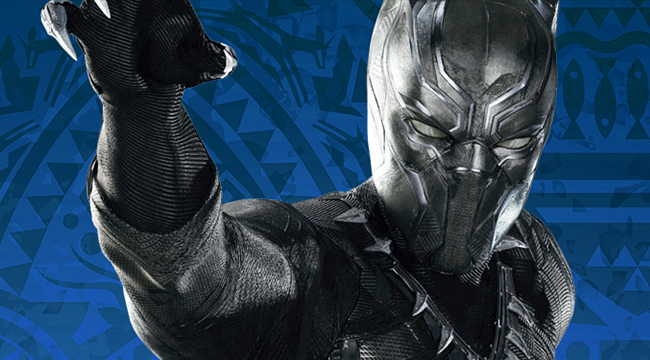
It’s true, Black Panther is a very different kind of Marvel movie. But, before we continue, I feel like this is a sentence that has been thrown around a lot. (And, yes, I am guilty of this.) There’s some truth that the earlier, Phase One Marvel movies did tend to have a similar feel as a way to establish this new universe. But somewhere along the line, that changed – probably starting with Shane Black’s brilliant Iron Man 3, and even further with Joe and Anthony Russo’s Captain America: The Winter Soldier, and even further again with James Gunn’s Guardians of the Galaxy. Yet, that stigma has stuck with Marvel, even though it’s fairly obviously no longer true. No reasonable person can watch Thor: Ragnarok and Black Panther back-to-back and say, “Those movies felt the same.”
And I mention Thor: Ragnarok because no two Marvel movies have been released so close to each other like this and yet been so vastly different. While Thor: Ragnarok is basically a comedy, Black Panther is about a completely independent African nation debating if it should use its secretly powerful influence in the outside world – and if so, how should it be used? Should it be a show of power, to rid the world of oppressors? Or should it be used more strategically? Black Panther is about the internal struggle of mighty Wakanda over what to do about the people struggling all over the rest of the world.
Directed by Ryan Coogler, Black Panther starts disappointingly, with animation accompanied by narrated exposition to explain the history of Wakanda – and frankly it’s the only part of the movie that doesn’t really work, because this kind of introduction just never works. Understandably, the filmmakers were in a tough spot, because there’s a lot to explain and it would probably take another 20 minutes to give the audience this information in a more natural way. For anyone who has read the current run of the comic, this is a dense story with a lot of information to relay. But, unfortunately, this gives Black Panther a bit of a lumbering start. The good news: the film more than recovers.
The film then takes us to Oakland, circa 1992, back when T’Chaka, the father of T’Challa, was Black Panther and king of Wakanda. He’s in Oakland to confront N’Jobo (Sterling K. Brown), who has been selling vibranium — a powerful metal that surrounds Wakanda and gives the nation its technology — to an arms dealer named Ulysses Klaue (Andy Serkis). What happens this night in Oakland will come back to haunt T’Challa many years later.
Black Panther then jumps to the present day, right after the events of Captain America: Civil War. T’Challa (Chadwick Boseman) returns home to Wakanda as the heir apparent to the throne after T’Chaka was killed by a bomb in Vienna. But there is growing dissent in the ranks. After it’s learned that Ulysses Klaue (Andy Serkis) has stolen vibranium from a London museum, many in T’Challa’s inner circle want action. Klaue has been stealing vibranium for years and enough is enough. T’Challa must capture Klaue, something his father failed to do.
T’Challa heads off to South Korea to find Klaue, in a dazzling sequence that involves casinos, espionage, the CIA (this is where we run into Martin Freeman’s Everett K. Ross, who we last saw in Civil War), and weaponized wigs. But soon T’Challa figures out that his real enemy isn’t Klaue, it’s a former black-ops American soldier named Erik Killmonger (Michael B. Jordan, who is fantastic). And Killmonger also has ties to Wakandan royalty (this has everything to do with what happened in Oakland) and challenges T’Challa for his throne. And there’s a surprisingly large number of Wakandans who are on Erik’s side, who like the idea of using Wakandan technology to defeat oppressors around the world, leaving Wakanda in charge of the planet.
One of the greatest tricks Black Panther pulls off is somehow incorporating so many good roles beyond the title character. (Read our interview with screenwriter Joe Robert Cole about bringing these characters to life here.) Jordan’s Killmonger actually has a full arc and has some reason behind what he’s doing – which gives us one of the best Marvel villains to date. (And he’s complicated enough that “villain” isn’t even really the right word.) Lupita Nyong’o’s Nakia is T’Challa’s ex and a spy for Wakanda who seems, too often, to have to come to the aid of her former lover. Danai Gurira’s Okoye is the head of the Dora Milaje who has numerous memorable moments, including the aforementioned weaponized wig. And, boy, Letitia Wright’s Shuri, T’Challa’s younger sister, is such a charmer. If this were a James Bond movie, she’d basically be Q, only kinda, sorta running the whole operation. Even Martin Freeman, who wasn’t particularly memorable in Civil War, gets some compelling moments here after he’s injured and taken to Wakanda and quickly realizes that, as an outsider, he’s not particularly welcome. At one point Shuri refers to him as “colonizer.”
But Black Panther is also a different kind of Marvel movie (there I go again) because it’s surprisingly low on straight-up action sequences. Yes, there are some, but in a way they almost feel obligatory. It’s obvious Ryan Coogler didn’t direct Black Panther to make an action movie. Instead, it’s a dense movie about family, community, internal struggle, and external struggle. And it’s a movie with a lot on its mind. Marvel Studios head Kevin Feige has been pretty quiet on what’s coming after 2019’s still-untitled fourth Avengers film, but there’s no doubt that Black Panther is going to play a huge role in whatever is next. Black Panther feels like the beginning of something new.
You can contact Mike Ryan directly on Twitter.






